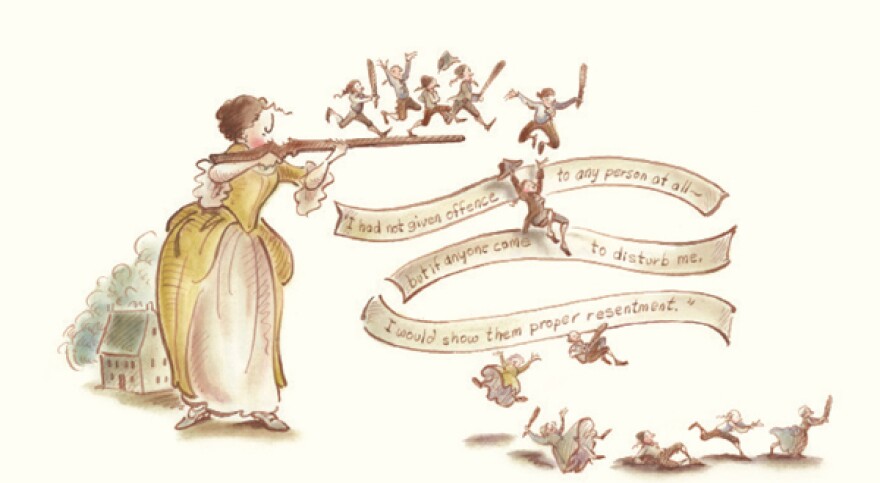At the time of the American Revolution, married women in America were not even allowed to own property, let alone vote. Because women did not sign the Declaration of Independence, serve as generals in the war, or get elected to public office, they are not often mentioned in the history of the time.
But despite their lack of official roles, there were women who helped found our nation through their words and deeds, and through their association with the men who have become known as our Founding Fathers.
Ten years ago journalist and political commentator Cokie Roberts wrote “Founding Mothers” to highlight the instrumental roles of these women. As the daughter of politicians, she knew firsthand the influential role the wives and daughters of politicians could have.
“I spent my childhood growing up in Washington in the 40s and 50s seeing the incredible influence of the political women of that era, people like my mother Lindy Boggs and Betty Ford and Lady Bird Johnson. They were running everything. They ran the political conventions, they ran voter registration drives, they ran their husband’s campaigns,” Roberts said.

“I saw the tremendous influence they had, and figured that the women of this very, very importance period in our history – when our very nationhood was conceived—had to be have been at least as influential, and that’s one of the reasons why I started to try to find out about them.”
Roberts is a contributor to NPR's Morning Edition and a political commentator for ABC News.
Now a new illustrated version of the book, “Founding Mothers: Remembering the Ladies” is out. It introduces these women to a younger audience with pen and ink drawings by Diane Goode.
The book gives a timeline of events, short biographies of ten women and a page each highlighting women writers and women warriors of the day.
One way women of the day could have influence was by writing letters, poems, plays supporting independence, as Mercy Otis Warren, Phillis Wheatley and Annis Boudinot Stockton did.

Phillis Wheatley came to America as a slave when she was around 7 or 8 and brought into the Wheatley household in Boston to help with housework. When the family discovered her intelligence, they encouraged her learning and eventually freed her. By the time she was a teenager her poetry was already being published in newspapers, making her the first African American woman to be a published writer.
Other women followed their husbands to war, often because they would have had no way to support themselves otherwise. Some women even took an active fighting role, either by pretending to be a man like Deborah Simpson did, or by taking over their husband’s job, as Margaret Corbin did during a battle at Fort Washington.
When Margaret Corbin’s husband John was killed during battle, she took over his artillery position and kept the cannon firing through the rest of the battle despite being shot three times.
Three of the women featured in the book –Martha Washington, Dolley Madison and Abigail Adams—became First Ladies. But their biographies show that they were more than merely the wives of presidents.
Also featured in the book are the financially savvy Eliza Lucas Pinkney, who ran her family’s plantations in South Carolina; Esther Deberdt Reed, who organized a fund-raising drive for the American troops; and Deborah Read Franklin, the wife of Benjamin Franklin.
Although Benjamin Franklin was nominally the Post Master General, Deborah Franklin ran the postal service as well as her husband’s businesses for 17 years while he was overseas representing the Pennsylvania colony in England.
“She at one point had to defend their house because his neighbors felt that he had not been sufficiently ardent against the Stamp Act and they were furious with him and ready to come burn down the house,” Roberts said. “She got a gun and got some cousins with guns and they protected the house. And he wrote to her from England and said ‘Well done Deborah.’ But he refused to come home.”

Unlike most women’s correspondence during the 18th century, Abigail Adams’ letters to her husband have been preserved.
“She was so ardent for independence that it drove her completely nuts that the men in Philadelphia meeting at the Continental Congress were just taking forever to declare independence,” Roberts said. “Finally when it appeared that it was going to happen, she realized that there would have to be a new code of laws for a new country. And that’s when she wrote the famous words to John, her husband, saying when you write that new code of laws remember the ladies because all men would be tyrants if they could.”
The idea was so radical for the time that John Adams laughed it off despite his usual appreciation for his wife’s opinions, Roberts said.
Women today have an easier time making the history books, but their role in history still needs to become more well-known. Roberts has had people tell her that they like her book but they don’t have a daughter to give it to. Her response? Why not give it to your son.
St. Louis on the Air provides discussion about issues and concerns facing the St. Louis area. The show is produced by Mary Edwards and Alex Heuer and hosted by veteran journalist Don Marsh.





